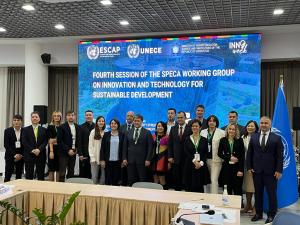
With a long history of reliance on resource-based industries for growth, countries of the United Nations Special Programme for the Economies of Central Asia (SPECA) - Afghanistan, Azerbaijan, Kazakhstan, Kyrgyzstan, Tajikistan, Turkmenistan, and Uzbekistan - have embraced the power of innovation for further growth and for delivering on their commitment to achieving the Sustainable Development Goals (SDGs). Most importantly, close cooperation on innovation is key to turning the SPECA region into a powerful regional economic and innovation hub while capitalizing on the opportunities the region possesses, namely a young and growing skilled population, competitive wage levels, strong public research, and geographical location.
Fostering innovative entrepreneurship, using blockchain technologies to improve cotton traceability, changing business models and operations to transition to a circular economy, enhancing digital connectivity and regional cooperation were therefore high on the agenda of the recent fourth session of the SPECA Working Group on Innovation and Technology for Sustainable Development, jointly organized by UNECE and the United Nations Economic and Social Commission for Asia and the Pacific (ESCAP).
UNECE has played a crucial role in supporting the SPECA participating States in this transition by championing their capacities to design and implement innovation policy for sustainable development through dedicated reviews (e.g., the latest is on Uzbekistan), to support innovative entrepreneurship by organizing trainings and workshops for policymakers and managers of business incubators, and to facilitate the transition to circular economy by initiating policy discussions and expertise sharing.
To support the SPECA participating States’ ambition to become a regional innovation hub, UNECE has taken regional cooperation on innovative entrepreneurship to the next level by launching the SPECA Network of Business Incubators and Accelerators for Sustainable Development. The SPECA Innovation Strategy for Sustainable Development is another major element of regional cooperation on innovation that UNECE leads on.
The discussions during the meeting highlighted the important contribution the implementation of the Strategy and its Action Plan have made to fostering innovative ecosystem in the region and the need for closer regional cooperation going forward. The SPECA participating States have clearly demonstrated their commitment to championing their innovation policies and pulling together resources through closer regional cooperation to turn the SPECA region into an innovation hub. Thus, Kazakhstan launched an initiative to host a UN Digital Solutions Center for SPECA, while Kyrgyzstan and Tajikistan voiced their strong interest in exchange of good practices with other countries in the region on innovation and, together with Kazakhstan, requested further UNECE support in developing and strengthening their institutional capabilities in innovation policy.
In addition, Uzbekistan demonstrated an example of using advanced innovative technologies such as blockchain to bolster compliance with environmental, social, and governance (ESG) standards in the textile sector through cooperation with UNECE and drawing on the organization’s expertise in this domain. With discussions led by UNECE during a Business to Business (B2B) event, Uzbekistan shared its successes on circular economy business models and is well set to take a leadership role in the region to drive transformation for the circular economy transition in the SPECA region.
For more information and updates on the fourth session of the SPECA Working Group on Innovation and Technology for Sustainable Development, visit the official UNECE and ESCAP websites. For further information on Innoweek Uzbekistan, please visit the official website and see the programme for Innoweek 2023.